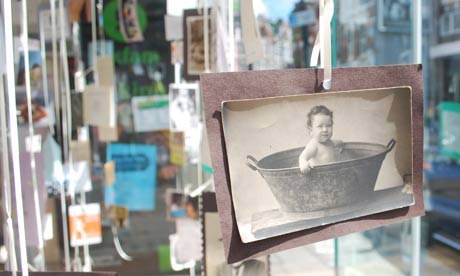
In the window of a secondhand bookshop in North London hangs, among other things, a chest x-ray, an air freight invoice and the handwritten guest list to a party, complete with notes for the host's speech. Inside the shop, about a dozen photo albums containing family holiday snaps, wedding day memories, pictures of pets and more are laid out on a table for customers to browse through.
They may well recognise some of the items. All have been accidentally sent to the shop in boxes of donated books, many of them stuck between pages as makeshift bookmarks by previous owners. All these articles are on display to give people a chance to see them, and claim them back. The shop's manager tells me that so far only one, a photograph of a cat, has returned home.
Each one of these found objects tells a story about the people who have read, enjoyed, and donated their books, just like the handwritten dedications and scribbled annotations so often found in secondhand texts. In the literature section there's a nice copy of Flann O'Brien's At Swim-Two-Birds, with a cover detailing part of a painting by Jack B Yeats. Inside, on an age-yellowed page is a dedication written in 1982, when it was apparently given as a gift. It reads: "To Dear Steve, Love Paul xx". A pencilled price mark, different to the price it now carries, suggests the book has changed hands more than once since. I take the book to the counter, hand over my money and take it home. When I've finished, I can leave it on my shelf to re-read at my leisure, give it to a friend, sell it online or take it back to this charity shop for someone else to pick up.
These kinds of pleasures are not afforded to customers of Amazon's ebook service, some of whom discovered on Friday that their electronic copies of George Orwell's Animal Farm and Nineteen Eighty-Four had been removed from their Kindle devices, seemingly Big-Brother style. The move prompted upset online, as blogs rushed to condemn Amazon's actions and customers expressed confusion as to why the novels had been deleted. The irony of one of the titles withdrawn wasn't lost on Twitter users. "I dread to think what happens if you buy Fahrenheit 451 for your Kindle," tweeted @kevinmarks.
The explanation came that the publisher who uploaded the novels did not have the rights to do so. Amazon has said it will change its systems to avoid this happening again and, in future, will not delete ebooks that have already been purchased. The customers all received a full refund. But the episode has raised questions about the difference between the experience of owning a book in the non-virtual world, and buying a downloaded text online.
I have myself been tempted by the idea of buying some kind of ebook reader. The thought of only having to pack one lightweight device containing all my holiday reading, and the supposed environmental benefits, not to mention the sheer gadgetry of it, made it a tempting idea. The Kindle, which is only available inside the US, wasn't an option for me, but it has in the past received praise for its ease of use, speed and innovation. It has even been hailed as the saviour of newspapers, thanks to its subscription service. However, quoted in the New York Times, Bruce Schneier, chief security technology officer for British Telecom and an expert on computer security and commerce, sums up much of the online reaction to Friday's debacle: "As a Kindle owner, I'm frustrated. I can't lend people books and I can't sell books that I've already read, and now it turns out that I can't even count on still having my books tomorrow."
Standing in the bookshop on Saturday, surrounded by all those lost and found items, those feelings just didn't apply. That's where Kindle, and devices like it, can never really compare with actual physical, secondhand books, so obviously owned you can even learn a little about their previous owners. The creased spines and turned down pages, those makeshift bookmarks from a bygone age, all signs that the book, which is now yours, has been in the past a real, tangible, treasured possession. I guess that's something that ebooks, with all the benefits they may bring, will never have.

